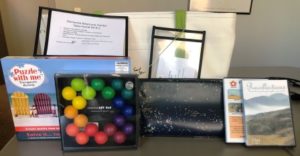 For older people on the memory loss spectrum, life can be difficult. It’s easier to feel left out from the community and cut off from resources and support structures. But the Library is working to change that.
For older people on the memory loss spectrum, life can be difficult. It’s easier to feel left out from the community and cut off from resources and support structures. But the Library is working to change that.
The Memory Cafe, launched at the Library in 2018, is a program developed to support and connect those experiencing memory loss and their care partners across Evanston and beyond. It takes place regularly on Thursdays at 11 a.m. with a rotating set of themes or activities with each meeting. Participants have presented personal belongings for show and tell, enjoyed music from decades past, shared memories through art projects, and much more.
It’s a program that has been successful at plenty of other libraries across the country, according to Jill Skwerski, the Library’s Engagement Services Manager. She said that she wanted to bring that support to seniors dealing with dementia and memory loss in Evanston.
“We have whole departments devoted to youth services and teen services and adult services, but no specific support for senior citizens,” Skwerski said. “I just saw that gap.”
Along with the Memory Cafe, the Library also has a special selection of materials, the Dementia Resource Center, specifically focused on educating patrons about memory loss. Resource kits are also available to help promote mental stimulation with everything from puzzles to musical instruments and coloring books.
Pim Halka, who worked as a community engagement library assistant with Skwerski, worked to coordinate Memory Cafe meetings, develop programming, and bring in presenters to facilitate meetings. Halka said that memory loss can have a huge impact on a person’s well-being and sense of belonging in the community. The Cafe functions as a way to get that sense of belonging back.
“It’s an isolating and scary thing to live with,” Halka said. “It’s very necessary for people to be able to collaborate and come together and meet other people going through similar experiences.”
But the Memory Cafe is much more than just a support system for those on the memory loss spectrum. The program builds on the model developed at other libraries and strives to be an inclusive space for everyone affected by memory loss in a senior’s life, Skwerski said.
“We wanted a space where caregivers and those who have the disease could come and be in community,” Skwerski said. “It really was intentionally focused on not only the person with the disease but also the caregiver.”
Over the years, the leadership and management of the Memory Cafe have changed hands. Bridget Petrites and Paula Shapiro are currently spearheading the program. Shapiro has also taken on a leadership role in the local Dementia-Friendly Evanston Initiative group which exists to create a more dementia friendly community. Both love working with seniors, and they’re inspired by the way the participants are able to bond with one another and share their experiences living with memory loss.
“You can see that for them it’s a way to unburden themselves, and to share, and feel like this is a space where (they) can go and do that,” Petrites said.
The past year and a half have shaken things up, of course. When the COVID-19 pandemic hit, the Memory Cafe was forced to adapt to social distancing guidelines along with the rest of the world—but operating in the digital environment had surprising advantages. The group went from monthly in-person meetings to weekly Zoom meetings that were more frequent and accessible for some members of the community, and guest presenters had more availability to attend gatherings virtually.
When and if things return completely to normal and in-person gatherings begin again, Memory Cafe meetings may remain available through virtual platforms. After all, Shapiro said, the option of remote attendance makes the program much more accessible for some.
“Seniors have been socially isolated before COVID happened and they’ll be isolated after, and I think that it’s nice that they have an option if they are home-bound to connect with other people,” she said.
Of course, technology can still be a barrier for many in Evanston who have limited access to computers, phones, or Wi-Fi. But the Library is working to bridge the digital divide by providing tech resources, assistance, and internet access to Evanstonians in need across the city. Finding ways to promote connections and resource availability in the local community is one of the Library’s top priorities.
In the future, Petrites and Shapiro are looking to continue the work they’ve been doing and keep connecting to people through the Memory Cafe. They encourage those with loved ones experiencing dementia or memory loss to introduce them to the group, maybe even take them to a meeting or help them set up their Zoom connection. Shapiro said that anyone can be a part of this community if they’re interested in supporting it, and anyone can gain something from the experience, too.
“It really has become sort of a safe space for all of us,” Shapiro said. “I’ve learned so much from them and their stories.”
The next Memory Cafe meetings will take place virtually over Zoom on August 5, August 12, August 19, and August 26. Register at epl.org.

